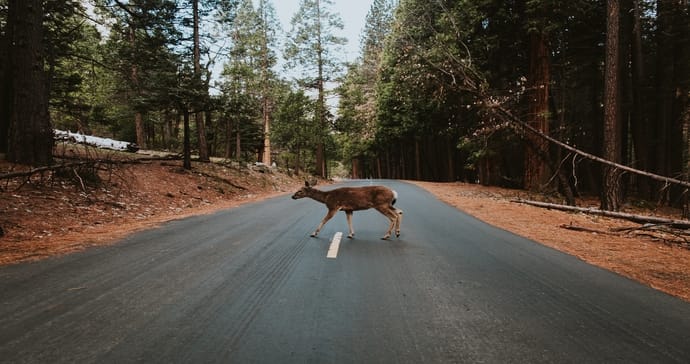
As cooler weather approaches and the seasons change, it’s essential to know the facts about hitting a deer. Animal-vehicle collisions increase in the fall and can cause significant damage.
1. Iowa is a High-Risk State for Deer Accidents
Iowa is a high-risk state for animal collisions, ranking 5th overall during the 2018-2019 peak season. During the year, Iowa drivers had a 1 in 55 chance of being involved in an animal collision. Comparatively, the chance of hitting an animal was 1 in 116 across the country; State Farm estimates there were approximately 1.9 million animal collision insurance claims nationwide during the 2018-19 season. According to the Insurance Institute for Highway Safety, deer-vehicle collisions caused 211 fatalities in the U.S. in 2017.
2. Your Chances of Hitting a Deer Are Highest on Winter Nights
October through December are the highest-risk months for deer-vehicle collisions because of hunting and mating seasons. The deer population is at its highest, and hunters can frighten deer into more populated areas that they don’t usually frequent. Collisions are more common during the dusk to dawn period, due to a combination of reduced visibility and increased animal activity. This is meal time for deer!
3. You Should Treat a Deer Accident Like any Other Collision
Just like any other accident, if you hit a deer you should immediately move your vehicle to a safe location and ensure that it is visible to others by turning on your hazard lights or putting up reflectors/road flares. If you or anyone else is injured, get medical attention as soon as possible. Collecting evidence at the scene can be helpful to document your property damage and any injuries to yourself or passengers. Take photographs and obtain contact information from any witnesses.
You should call the police or highway patrol if you hit a deer, especially if the carcass may pose a roadway hazard to other drivers. If the collision resulted in property damage (to your vehicle or other objects), you may be required to file a police report. This report can also be helpful in filing your insurance claim. The circumstances of the accident (as well as your driving history and many other factors) can influence whether your insurance premiums are affected.
4. You Might Be Entitled to Keep the Carcass If You Want It
Do not approach an injured animal. Contact the Department of Natural Resources or the appropriate state agency to discuss your options and responsibilities. The rules of whether it’s legal to take possession of a roadkill deer carcass vary from state to state. In those that allow the practice, including Iowa, the driver or drivers involved in the accident usually get the right of first refusal. A driver or other individual may call the Iowa Department of Natural Resources to obtain an on-the-spot roadkill salvage tag over the phone. Some states authorize private companies to collect and use the carcasses, while others maintain their own regulated disposal services.
5. You Probably Don’t Need Deer Insurance—Comprehensive Car Insurance Usually Covers Collisions
A deer collision can be costly! The average auto insurance claim cost for striking a deer, caribou, elk, or moose was around $4,000 during the 2017-18 season. As cars get more and more technologically advanced, the cost of these collisions may continue to increase.
Liability or collision insurance (the kind required by most states for drivers) generally won’t cover damage caused by deer or other animal collisions. Comprehensive coverage, on the other hand, will usually cover repairs to your vehicle, minus the amount of your deductible. Policies with higher deductibles may have lower insurance premiums, but you will have higher out-of-pocket expenses following a collision. Talk to your insurance agent about the deductible and coverage levels that are right for your vehicle and your driving habits.
We hate to see people spending thousands of dollars on insurance, yet not having that money work as it should. Request a free insurance review to see where you could be saving!
{{cta('c97d3c64-ab5c-455d-8d38-0444fa8e27ba')}}
For more information about auto insurance coverage, subscribe to our blog!



